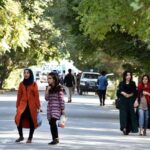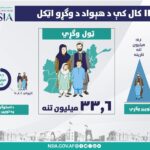The Government of the Islamic Republic of Iran has formalized access to banking services – including debit cards, for Afghan refugees in the country. Before the new policy was announced, banks around the country followed different practices, which meant that some refugees could access banking services but most could not. Now, all refugees will have a more secure means of managing their finances.
UNHCR, the UN Refugee Agency, spokesperson Babar Baloch at a press briefing at the Palais des Nations in Geneva said, “Without a bank account, refugees are compelled to keep large sums of money at home and travel with cash when making or receiving payments – increasing their risk of losing savings due to security incidents like fire or theft. In Iran, as elsewhere, there has also been a growing preference for digital payments instead of cash to avoid unnecessary physical transactions during the COVID-19 pandemic. Salary payments, online purchases, university registrations, and reimbursements of healthcare fees are now also mostly made via online bank transfers. This makes the issuance of bank cards a very important and welcome step that can greatly benefit refugees in their daily lives.”
Under the new policy, UNHCR hopes to channel its assistance through bank transfers, giving refugees a more dignified and flexible choice in how they use their cash. “Financial inclusion can contribute to refugees’ resilience, empowering them to meet their needs in a safe, sustainable and dignified manner, and helping them avoid negative coping mechanisms,” Baloch said.
For over 40 years, Afghan refugees have been welcomed and generously supported by the Government of Iran. Recognizing this contribution, UNHCR continues to call for more equitable international responsibility and burden sharing with Iran. As of today, the US$97.9 million needed to assist Afghan refugees in Iran during 2021, is only 8 per cent funded.
Meanwhile, in Afghanistan according to a report released on Tuesday by Médecins Sans Frontières (MSF), the healthcare system is ill-adapted to the challenges faced by the Afghan people.
The report, The Continued Struggle to Access Medical Care in Afghanistan, brings together medical data, interviews and questionnaires from patients, their caretakers and staff in MSF’s projects in Helmand, Herat, Kandahar and Khost provinces. It clearly shows a healthcare system that is failing the population, and echoes the findings of previous MSF reports released in 2014 and 2020.
Over the years, MSF has continued to expose the discrepancy between the promises of the donor-promoted model of public healthcare delivery and the reality on the ground. “Poorly functioning health facilities, unaffordable costs, and patients who undertake long and dangerous journeys. These all reduce people’s ability to access timely medical care,” says Filipe Ribiero, MSF Afghanistan country representative.
Last year, international donors cut funding for services in Afghanistan increasing pressure on an already fragile public health system and on health partners. The emphasis needs to be on Afghans receiving quality treatment closer to home, in line with their needs and financial circumstances.













